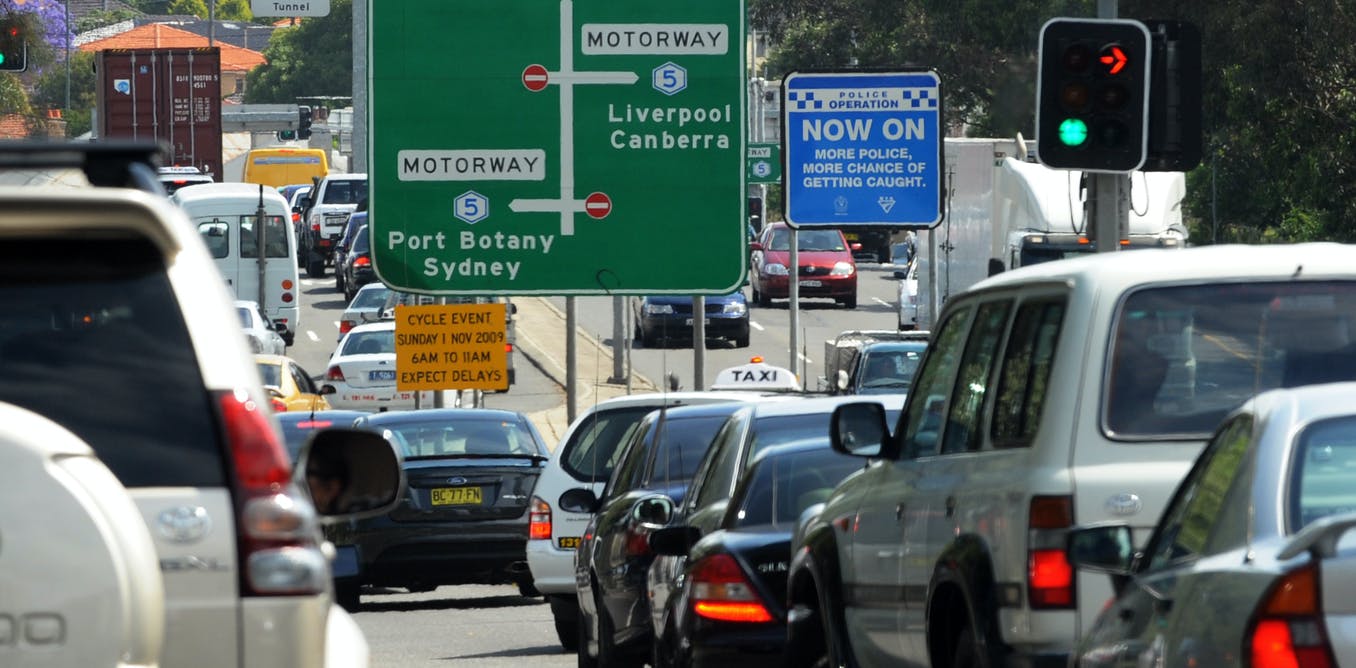Australia needs stricter rules to curb air pollution, but there’s a lot we could all do now

Have you ever left your car running as you wait for a passenger to return from a quick errand? It’s called idling, and while it may feel easier than switching it off and on again, it wastes money and fuel, and dumps pollutants into the air. Vehicle emissions are a very significant contributor to air pollution, which causes health problems.
Few of us would leave the tap running or the fridge door open, and many are diligent about turning off lights. But when it comes to air pollution, many people are wasteful and unaware.
We need major public health campaigns to change people’s beliefs about what they can do to reduce air pollution, similar to the campaigns and enforcement that made our public spaces smoke-free and our schools and beaches sun smart. Australia also needs stronger policy aimed at curbing air pollution.
The Australian government’s fuel efficiency standards and noxious vehicle emission standards review, under way now, offers a chance to do that – but what’s been proposed so far doesn’t go anywhere near far enough.
A lack of awareness and weak standards
Air pollution is associated with cardiovascular disease, respiratory disease, dementia, cancer, pregnancy complications and adverse birth outcomes.
Many governments around the world now ask citizens to stay home when particulate matter – meaning the mix of solid particles and liquid droplets in the air – from vehicles, fossil-fuel and wood burning are at hazardous levels.
And bans on diesel vehicles in some places are part of a broader push to cut the amount of harmful particulate matter, nitric oxide and nitrogen dioxide in the air.
Australia, by contrast, lags behind the rest of the world on policies to reduce air pollution. Take, for example, our rules on sulfur in fuels – a particularly damaging component of vehicle emissions.
Australia has one of the world’s most lenient sulfur standards for petrol, allowing 150 parts per million. That’s 15 times the limit allowed in the European Union, Japan and the US. It’s three times what’s allowed in Brazil and China (China will allow just 10 parts per million from 2018).
Australia’s air quality standards, which are also being reviewed under the National Clean Air Agreement, feature good targets – even better than the World Health Organisation recommendations for PM2.5. However, without stricter measures to reduce vehicle emissions, these air quality targets will not be achieved.
The Australian government’s review of fuel efficiency and vehicle emission standards is looking at particulate matter, ozone, nitric oxide and nitrogen dioxide (known collectively as NOx), and carbon. But what has been proposed so far worryingly includes a do-nothing scenario.
Doing nothing comes with significant cost
The OECD estimates that there are approximately 740 preventable deaths per year in Australia due to ozone and PM2.5 (the very fine particulate matter from vehicle emissions which, when inhaled, goes deep into the lungs and can pass into the bloodstream), but that does not include NOx – so these are very conservative estimates.
To put this in context, there are 1,280 deaths on our roads each year and another 740 deaths due to vehicle emissions. This is a significant cost for choosing a transport system reliant on fossil fuel.
If the strictest standard being considered by Australia under the review – the Euro 6 standard – is mandated for both light and heavy vehicles, a net benefit of A$675 million will be realised by 2040. This figure is very small compared to the current annual cost of vehicle pollution to Australia of A$4 billion.
But the standard Australia considers the strictest option is actually business as usual now in the US and Europe. Surprisingly, the impact statement doesn’t even discuss banning or phasing out diesel vehicles in cities – a policy that experts now consider global best practice.
What could be done?
The decisions being made this year on Australia’s fuel efficiency and vehicle emission policies can improve the health of our urban air. This is a great chance to simultaneously improve fuel efficiency, demand higher-quality fuels and implement emission testing for vehicles to improve the air in our cities.
In the short term, we can all try to use cars less often and not idle our cars when in use. Raising awareness helps; a recent study showed millions of dollars could be saved in fuel costs by exposing drivers of fleets to anti-idling initiatives.
Purchasing a vehicle with automatic idle-stop technology will help cut vehicle emissions. This technology, popular in high-end European car models, automatically switches off the vehicle when it is still and allows the driver to restart the car when their foot presses the accelerator.
To achieve a population-level benefit from such technology, however, would require policymakers to include it in the Australian Design Rules, the national standards for vehicle safety, anti-theft measures and emissions. That process can take many years.
A more sustainable approach to air pollution would be to upgrade Australian refineries to supply low-sulfur fuel. Although costly, the alternative – the escalating health burden associated with vehicle emissions – is a cost too high for society to pay.
We cannot afford to continually invest in a transport system operated solely on fossil fuels. Supporting public transport that operates with “clean” fuels (such as our trams and trains, which run on electricity) will go some way to reducing air pollution in our cities. It is worth noting, though, that while our electricity is mostly fossil-fuelled, this only shifts the air pollution to someone else’s backyard.
Importantly, we need to raise public awareness of the quality of our air and ensure the government considers the long-term ramifications of short-sighted policies.
We must all do our part to improve air quality in Australia – and that means not idling your car, which is an offence that can attract fines as high as $5,000 and/or jail time in some parts of the world.
We can survive weeks without food, days without water, but only minutes without air. Let’s start treating our air as the valuable commodity it is.
Robyn Schofield receives funding from the National Environmental Science Program's Clean Air and Urban Landscapes Hub, and the Australian Research Council.
Mark Stevenson has received funding from the NHMRC and the ARC.







